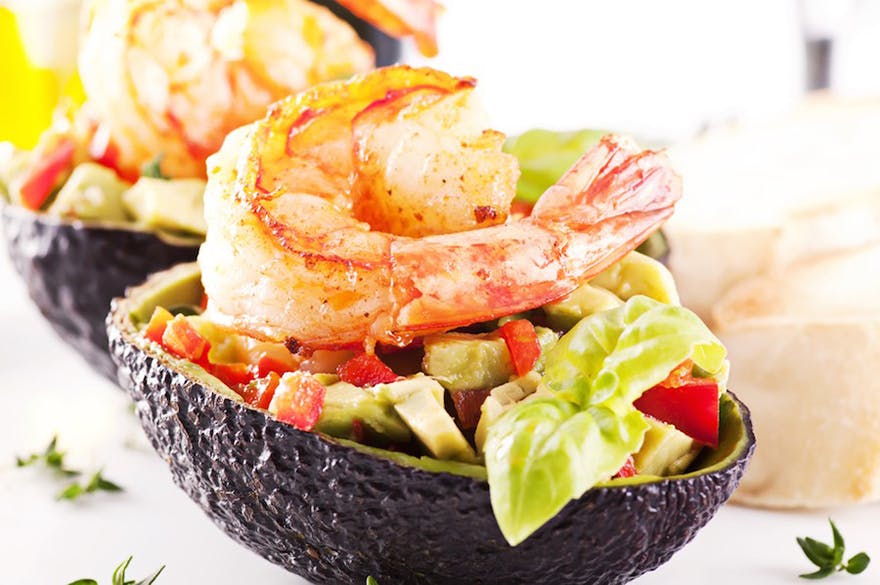6 Surprising Heart-Healthy Foods
HEALTH & WELLNESS
10.21.2014

You want a healthier heart, and you’re making changes to your diet to support one of your most vital organs. That’s great! But if you’re eating only the foods you think you’re supposed to have for heart health, you may be missing out.
Restrictive diets rob you of eating enjoyment as well as important nutrients for heart health. The following delicious and nutritious choices let you love what you eat and nourish your heart at the same time. Dig in!

1. Avocado: Avocados supply heart-healthy unsaturated fats, along with antioxidants, such as lutein, beta-carotene, and vitamin E, that play a part in protecting your ticker. Avocados are naturally low in sodium and rich in potassium, a winning combination to help lower blood pressure. High blood pressure is a risk factor for heart disease and stroke. Enjoy avocados in guacamole, on salads, and in sandwiches (smash and use as a sandwich spread instead of mayonnaise.)
2. Eggs: For decades, eggs have been blamed for elevated blood cholesterol levels that could contribute to heart attack and stroke. Yes, egg yolks are relatively rich in cholesterol, but eating cholesterol doesn’t translate into higher blood cholesterol levels for nearly all healthy people. Ironically, egg yolks supply nutrients that may help reduce the risk for heart disease, including vitamins B12 and folate. Research shows most healthy people can eat an egg a day as part of a balanced diet. People with elevated blood levels of total and low density lipoprotein (LDL) – bad cholesterol - and those with diabetes should consult their doctor about how many eggs are OK for them.
(Sources: Hu FB, Stampfer MJ, Rimm EB, et al. A prospective study of egg consumption and risk of cardiovascular disease in men and women. JAMA. 1999; 281:1387-99; Fernandez ML. Dietary cholesterol provided by eggs and plasma lipoproteins in healthy populations. Curr Opin Clin Nutr Metab Care. 2006; 9:8-12; Djousse L, Gaziano JM. Egg consumption and risk of heart failure in the Physicians’ Health Study. Circulation. 2008; 117:512-6.)
3. Shrimp:
Like the egg, shrimp gets a bad rap for its cholesterol content. But shrimp harbors nearly zero saturated fat, a type that raises blood cholesterol concentrations. Even better, shrimp is a source of omega-3 fats called DHA and EPA that benefit your heart, brain, and eyes. Shrimp is included in the expert recommendation to eat fish at least twice weekly (8 ounces total or more). Take pleasure in eating shrimp as an appetizer, sautéed with garlic and olive oil and served over pasta, baked, or grilled.

4. Nuts:
A recent study in the New England Journal of Medicine (NEJM) suggests that people who regularly munch on a 1-ounce serving of nuts (about a small handful) lived longer than those who rarely ate nuts. Nut-eaters had lower death rates from heart disease and other conditions, including cancer. Nobody knows why nuts help promote longevity, but it’s clear that they provide a plant-based protein source, heart-healthy fiber, and beneficial antioxidant nutrients. Snack on nuts, top salads with them, and stir them into your morning oatmeal.
5. Dark chocolate:
Flavanoids are plant compounds that help to keep blood pressure in the normal range. Cocoa powder, present in higher levels in dark chocolate, is bursting with flavanoids. You won’t get a huge reduction in blood pressure by eating dark chocolate every day – possibly even less if you eat too much and it leads to weight gain – but the decrease may be enough to make a difference in your heart health. About an ounce of dark chocolate daily helps blood pressure to fall slightly. Hot cocoa is another delicious way to work in flavanoids. Make yours with fat-free milk, cocoa powder (which is virtually calorie-free) and the sweetener of your choice. Add a tablespoon of unsweetened cocoa powder to your favorite chili and stew recipes to elevate flavor and nutrition.

6. Grains.
Some grains are better for your heart than others. An eating plan rich in grains with highly refined carbohydrates, such as white bread, crackers, and sugary treats, elevates blood glucose to levels that could affect heart health. There’s no reason to banish whole grains, however. Whole grains supply several nutrients, including heart-healthy fiber. A new study in the British Medical Journal found that people with higher fiber intakes had a lower risk for heart problems. Snack on popcorn (a whole grain!) instead of pretzels, and try a new whole grain, such as quinoa, for a change.
Image Credits: hlphoto/Shutterstock.com
Recommended Articles
The 5 Best Foods That Will Help Supercharge Your Brain
Amidst our busy schedule, it's important to retain our focus and memory. Resting alone is not...
Iron deficiency is a lot more common than you would think. A recent survey by SATA CommHealth(i...
Mars vs Venus: Understanding the His and Hers of Nutritional Needs
Mars vs Venus: Understanding the His and Hers of Nutritional Gaps Although their DNAs are...






